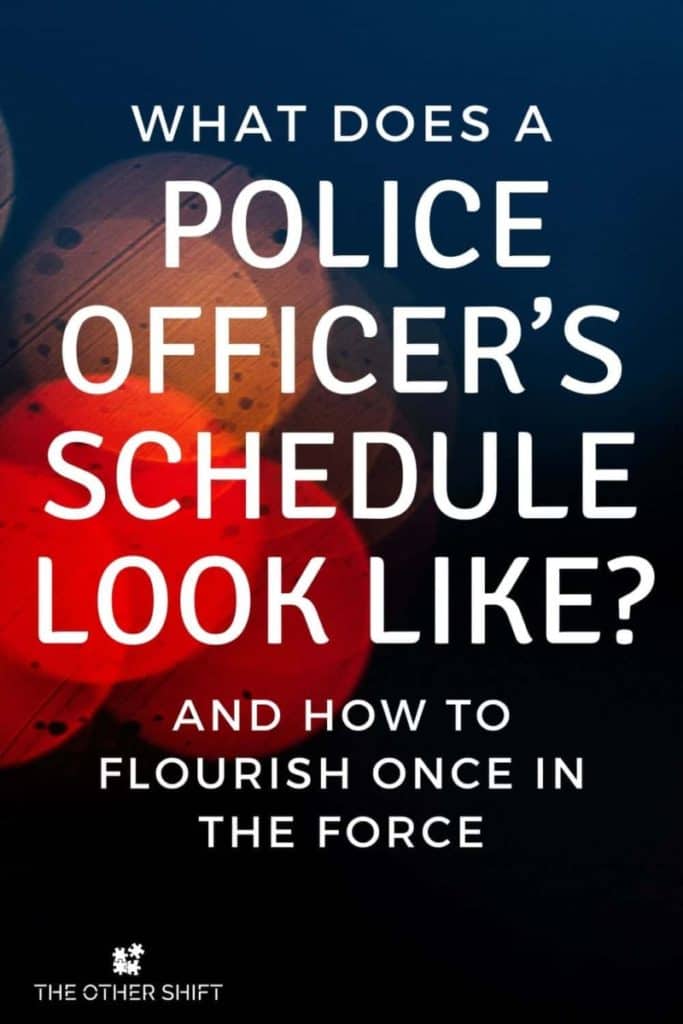Disclosure: This page may contain affiliate links, meaning we receive a commission if you decide to make a purchase through our links, but this is at no additional cost to you. Please read our disclosure and privacy statement for more info.
Some people have no idea what a typical schedule looks like for police officers. Others might know the logistics of it and are unsure if they are able to do it, whilst some think they know what those twelve-hour shifts entail, but maybe a fair way off. Those that do understand it, know it takes a special person to maximize a police officer’s daily routine.
Police officers work unusual and often long hours. For some, dealing with these odd hours is easier than it is for others. Maintaining a healthy balance between work, exercise, friends and family can be difficult. With a little extra discipline though, it’s not impossible.
Police Officer’s Schedule Breakdown
The majority of law enforcement officers are slotted out to work a forty-hour work week. These hours can, and usually do include working nights, holidays, and weekends.
Getting held over for overtime is not out of the ordinary either. Because of the vital nature of police officer duties, shift work, unsocial hours, and emergency call-outs are part of the job.
But it’s not all doom and gloom. Here are some advantages to working these hours and also a post we wrote about the pros and cons of an alternative schedule.
to working these hours and also a post we wrote about the pros and cons of an alternative schedule.

Shift Variations
Very few police agencies have their officers on eight-hour shifts. For those that do, however, they are working five days a week like the normal 9-5 working class does.
They most likely, however, do not have their weekend on a Saturday and Sunday, and a lot probably work the night shift where they go to work before sundown and leave work late into the night.
Other agencies function on a ten-hour shift, sometimes with a “swing” shift. This means that there will be people working the night shift, people working an afternoon “swing” shift, and officers working a day shift. Each agency runs its hours a little differently, but this seems to be the norm for those on “tens”. This does mean however that these police officers will work four days in a row and then get three days off.
Interested in learning more about the swing shift? Check out this post  we wrote all about this unique shift which may suit you perfectly!
we wrote all about this unique shift which may suit you perfectly!
The most common shift though is the twelve hour shift rotation.
With this, typically, there will just be a day and a night shift, also known as the “alpha” and a “bravo” shift. They will rotate in and out, with different squads coming in at different times.
An example might be day shift has three separate start times with three separate morning briefings at 5am, 6am and 7am. Night shift will follow suit with three briefings starting at 5pm, 6pm and 7pm.
The nice part about these twelve-hour shifts is that one week, you might work three days with four days off, and the next week you will work four days with three days off. Plenty of time to space out and enjoy some rest at home!
If you find yourself on a long shift of 12 or more hours, I produced a blog post just for you. Feel free to watch below and let me know in the comments of your experience.
Typical Police Officers Sleep Schedule
The ever-changing demands of police work present distinct challenges for maintaining a healthy sleep cycle. Early morning shifts, often starting before dawn, necessitate meticulous planning and early wake-up times to ensure adequate preparation and rest. Depending on commute distances, some officers may find themselves waking up well before 5 am to reach their posts on time. This calls for an early bedtime to get the recommended 7-9 hours. Especially considering you need all the sleep you can get to make it twelve hours for three or four days in a row.
Conversely, night shifts require adjustments to align with the body’s natural sleep-wake cycle. Working through the night can disrupt circadian rhythms, leading to later bedtimes (around 8 am or 9 am) and extended sleep periods (until 4 pm or 5 pm) to achieve the recommended 7-9 hours of rest.
If you’re struggling with night shift, we can help. We have many resources and blog posts to help guide you. If you require more help, feel free to email us at [email protected].
- Night shift essentials

- Night shift sleep aids

- How to stay healthy and not get sick whilst working nights


When is There Time to Keep up with Day-to-Day Life?
Juggling personal responsibilities with the demanding schedule of police work can be a juggling act. Whether navigating day, night, or swing shifts, officers often face challenges in managing errands, appointments, and other commitments amidst their professional duties.
For those on day shifts, coinciding work hours with essential services like childcare facilities can create logistical hurdles. Efficiently utilizing breaks and maximizing time off becomes crucial for managing personal tasks. Some officers, including the single parents, opt for alternative childcare arrangements or adjust their schedules to accommodate limited daycare hours.
Night and swing shifts present similar obstacles, but also offer pockets of availability during the day. Taking advantage of these windows for errands and appointments can be beneficial. However, prioritizing personal well-being and maintaining healthy sleep habits remains vital to avoid burnout and fatigue. Night shifts can disrupt sleep patterns, making it crucial to prioritize sleep hygiene and explore strategies for managing fatigue.
Adapting to a shift work schedule requires strategic planning and adjustment. Explore resources and techniques to optimize sleep, manage stress, and effectively balance professional demands with personal life. Time management skills become essential, and tools like scheduling apps and calendars can help officers stay organized and make the most of their limited free time.
Remember, prioritizing personal well-being is paramount. Techniques like maintaining consistent sleep schedules even on off-days, maximizing light exposure during daytime hours for night shifts, and creating a relaxing bedtime routine can significantly improve sleep quality and overall health. Additionally, seeking support from colleagues, family, and support groups can help officers navigate the unique challenges of a shift work schedule.
Through proactive planning, resourceful management, and a commitment to self-care, officers can find success in balancing the demands of their chosen career with a fulfilling personal life.
Adjusting to a shift work schedule can be interesting. Find out how to not only adjust to your new schedule but how to really flourish. See How Do You Adapt to Shift Work? 7 Tips to Transition Quickly.

Holidays
The unpredictable nature of police work extends to holidays. While many professions enjoy guaranteed time off during festive seasons, officers’ schedules often coincide with these periods.
Depending on your assigned shifts and the calendar’s whims, holidays may fall on your workdays. If you remain on the same rotating schedule year after year, you might eventually receive those specific holidays off. However, this depends on which day of the week they land on, adding another layer of complexity.
While working holidays can be challenging, it’s important to acknowledge the positive aspects. Many departments offer holiday pay, often comparable to overtime or time-and-a-half. This can be a significant financial boost, especially for those with less emphasis on social gatherings during these times.
Ultimately, the perception of working on holidays is personal. Some might find it disruptive, while others appreciate the financial rewards and the opportunity to serve their community during these special times.

Requesting Time Off as a Police Officer
Requesting time off as a newer, more junior officer can prove to be difficult. For the majority of police departments, requesting time off requires your submission to go through an approval process up the chain of command, starting with your sergeant.
Days off are usually granted based on staffing for that particular day and seniority. So, if enough officers are scheduled to work and be present, you might be ok. However, there is a magic number of officers that must be staffed each day. So you might find it tough to get everything you seek early on, but know this does get better should you stick it out.
If the number of officers working on a particular day falls short due to officers calling in sick, the department will give out overtime to officers who want to work on their day off to fill in the gap. Maintaining ample staffing is paramount each and every day.
Related post: Female Police Officer Interview: True Insight Into The Force

Impact on Social Life
Balancing a fulfilling social life with the demands of police work can be challenging. The ever-changing nature of schedules, often involving long hours and unpredictable shifts, can make it difficult to maintain regular connections with family and friends.
Exhaustion is a natural consequence of a demanding workday, especially after twelve-hour shifts or extended overtime. After such stretches, prioritizing rest and personal time becomes crucial for well-being. Honest communication with loved ones is essential in navigating this challenge. Sharing your schedule’s complexities and expressing your need for downtime can foster understanding and appreciation. You might be surprised by their willingness to adapt and find alternative ways to connect, whether it’s scheduling catch-ups around your available time or opting for shorter, more frequent interactions.
Missing out on traditional social gatherings like birthdays or holidays is a reality for many officers. However, proactive planning can help mitigate the impact. Suggesting alternative celebration dates that work for everyone ensures you don’t miss out on cherished moments with loved ones. Remember, a celebration is only meaningful if it includes the people who matter most.
Maintaining a healthy social life while navigating the demanding world of law enforcement requires flexibility, communication, and understanding. By prioritizing both personal needs and social connections, officers can find a balance that enriches their lives and strengthens their support network.
Additional points to consider:
- Explore virtual communication options to stay connected with loved ones despite busy schedules.
- Seek support from fellow officers who understand the unique challenges of shift work.
- Consider joining social groups or activities that cater to flexible schedules.
Remember, adaptability and open communication are key to fostering a fulfilling social life amidst the demanding realities of police work. By embracing these strategies, officers can maintain meaningful connections and enrich their lives beyond the badge.
You might also find these posts helpful. We discuss relationships and family and work and tips in balancing them all.
- Working Night Shift With Kids: How To Maximise Family Time
- Shift Work and Family. A Practical Guide For Busy Parents
- Working 2nd Shift With a Family: How to Remain a Solid Unit
- How to Keep Your Relationship Alive When Working Opposite Shifts

Impact on Relationships
The demanding nature of police work can have a significant impact on romantic relationships. The unpredictable schedules, long hours, and emotional toll can sometimes strain the bonds between partners, especially when their schedules clash.
For those with traditional 9-to-5 partners, the loneliness of evenings spent alone while their officer partner works can be a source of frustration and disconnect. However, it’s important to remember that communication and understanding are key. Openly discussing the challenges and needs of each partner can foster empathy and build bridges.
Maximizing quality time together, even amidst hectic schedules, is crucial. Treasured moments of simply sitting on the couch and enjoying each other’s company, even if brief, can go a long way in strengthening the bond.
Remember, you are not alone. Many couples navigate the challenges of shift work successfully. Resources and strategies are available to help you manage the challenges and maintain a strong, fulfilling relationship. Here are some additional points to consider:
- Explore flexible date nights: Consider scheduling dates outside of traditional dinner hours or weekends to accommodate your different schedules.
- Embrace technology: Utilize communication tools like video calls and messaging apps to stay connected throughout the day.
- Seek support from other couples: Connect with other couples facing similar challenges to share experiences and find encouragement.
- Prioritize self-care: Both partners need to prioritize their own well-being to maintain emotional balance and avoid resentment.
Through open communication, shared understanding, and proactive planning, couples can navigate the complexities of shift work and build even stronger, more resilient relationships.
After all of that, if you’re thinking about becoming a police officer, below is a video you may find helpful.
Summary: Navigating the Unpredictable Rhythm of Police Work
Police officer schedules are notoriously demanding, characterized by rotations, long hours, and unpredictable shifts. This can clash with traditional routines and social life, impacting personal relationships and well-being.
The benefits, however, are undeniable. Meaningful work, competitive pay, camaraderie, and the opportunity to serve the community provide significant rewards.
Navigating these complexities requires flexibility, adaptability, and communication. Officers can leverage seniority to secure preferred shifts and find strategies for managing personal time, relationships, and self-care.
Ultimately, the decision to pursue a police career requires careful consideration of its demanding schedule and unique lifestyle. While challenges exist, the potential for personal fulfillment and community impact attracts many to this vital profession.
Before you go, if you want some guidance on staying in shape whilst in the force – this blog will help!
Cheers,


Disclosure: This page may contain affiliate links, meaning we receive a commission if you decide to make a purchase through our links, but this is at no additional cost to you. Please read our disclosure and privacy statement for more info.


